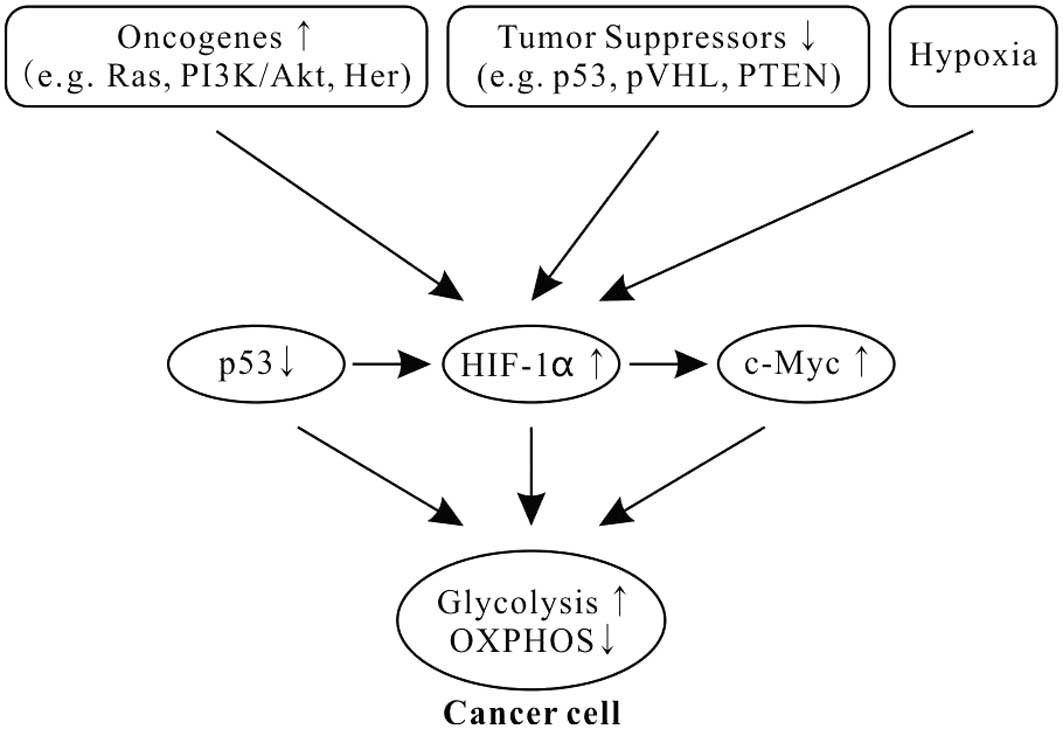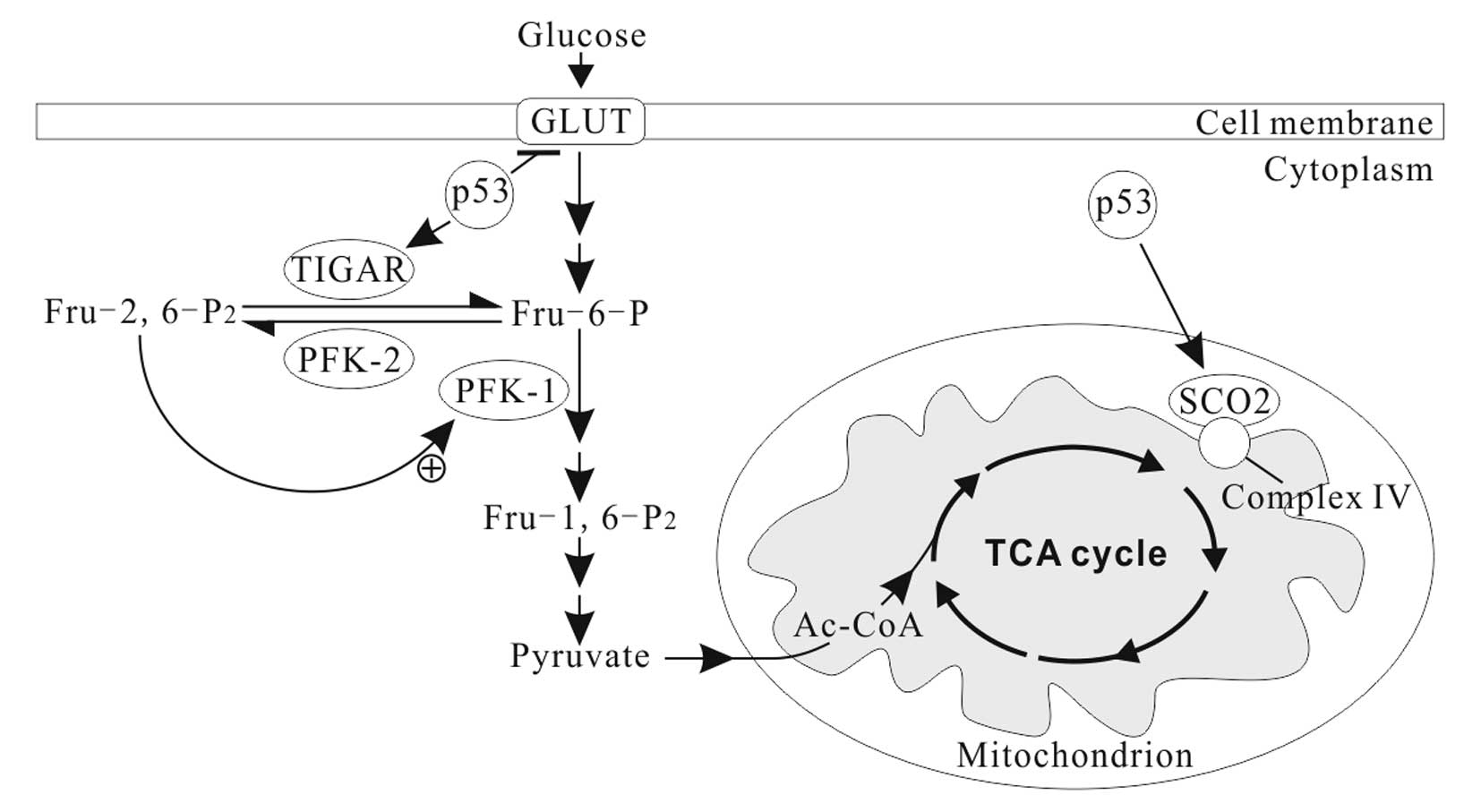|
1.
|
WH KoppenolPL BoundsCV DangOtto Warburg’s
contributions to current concepts of cancer metabolismNat Rev
Cancer113253372011
|
|
2.
|
G KroemerJ PouyssegurTumor cell
metabolism: cancer’s Achilles’ heelCancer Cell134724822008
|
|
3.
|
CE GriguerCR OlivaGY GillespieGlucose
metabolism heterogeneity in human and mouse malignant glioma cell
linesJ Neurooncol74123133200510.1007/s11060-004-6404-616193382
|
|
4.
|
VR FantinJ St-PierreP LederAttenuation of
LDH-A expression uncovers a link between glycolysis, mitochondrial
physiology, and tumor maintenanceCancer
Cell9425434200610.1016/j.ccr.2006.04.02316766262
|
|
5.
|
PP HsuDM SabatiniCancer cell metabolism:
Warburg and
beyondCell134703707200810.1016/j.cell.2008.08.02118775299
|
|
6.
|
HY LimQS HoJ LowM ChoolaniKP
WongRespiratory competent mitochondria in human ovarian and
peritoneal
cancerMitochondrion11437443201110.1016/j.mito.2010.12.01521211574
|
|
7.
|
DA ScottAD RichardsonFV FilippCA KnutzenGG
ChiangZA RonaiAL OstermanJW SmithComparative metabolic flux
profiling of melanoma cell lines: beyond the Warburg effectJ Biol
Chem2864262642634201110.1074/jbc.M111.28204621998308
|
|
8.
|
XL ZuM GuppyCancer metabolism: facts,
fantasy, and fictionBiochem Biophys Res
Commun313459465200410.1016/j.bbrc.2003.11.13614697210
|
|
9.
|
GA BrooksCell-cell and intracellular
lactate shuttlesJ
Physiol58755915600200910.1113/jphysiol.2009.17835019805739
|
|
10.
|
SN VaishnaviAG VlassenkoMM RundleAZ
SnyderMA MintunME RaichleRegional aerobic glycolysis in the human
brainProc Natl Acad Sci
USA1071775717762201010.1073/pnas.101045910720837536
|
|
11.
|
T PfeifferS SchusterS
BonhoefferCooperation and competition in the evolution of
ATP-producing
pathwaysScience292504507200110.1126/science.105807911283355
|
|
12.
|
A MiccheliA TomassiniC PuccettiM ValerioG
PelusoF TuccilloM CalvaniC ManettiF ContiMetabolic profiling by
13C-NMR spectroscopy: [1,2–13C2]glucose reveals a
heterogeneousmetabolism in human leukemia T
cellsBiochimie884374482006
|
|
13.
|
MV BerridgePM HerstAS TanMetabolic
flexibility and cell hierarchy in metastatic
cancerMitochondrion10584588201010.1016/j.mito.2010.08.00220709626
|
|
14.
|
JL ChenJE LucasT SchroederS MoriJ WuJ
NevinsM DewhirstM WestJT ChiThe genomic analysis of lactic acidosis
and acidosis response in human cancersPLoS
Genet4e1000293200810.1371/journal.pgen.100029319057672
|
|
15.
|
A MarusykK PolyakTumor heterogeneity:
causes and consequencesBiochim Biophys
Acta1805105117201019931353
|
|
16.
|
K SuganumaH MiwaN ImaiM ShikamiM GotouM
GotoS MizunoM TakahashiH YamamotoA HiramatsuEnergy metabolism of
leukemia cells: glycolysis versus oxidative phosphorylationLeuk
Lymphoma5121122119201010.3109/10428194.2010.51296620860495
|
|
17.
|
R Moreno-SánchezS Rodríguez-EnríquezA
Marín-HernándezE SaavedraEnergy metabolism in tumor cellsFEBS
J274139314182007
|
|
18.
|
C JoseN BellanceR RossignolChoosing
between glycolysis and oxidative phosphorylation: a tumor’s
dilemma?Biochim Biophys Acta1807552561201120955683
|
|
19.
|
K SmolkováL Plecitá-HlavatáN BellanceG
BenardR RossignolP JežekWaves of gene regulation suppress and then
restore oxidative phosphorylation in cancer cellsInt J Biochem Cell
Biol43950968201120460169
|
|
20.
|
PM HerstMV BerridgeCell surface oxygen
consumption: a major contributor to cellular oxygen consumption in
glycolytic cancer cell linesBiochim Biophys
Acta1767170177200710.1016/j.bbabio.2006.11.01817266920
|
|
21.
|
S Rodríguez-EnríquezL Carreño-FuentesJC
Gallardo-PérezE SaavedraH QuezadaA VegaA Marín-HernándezV
Olín-SandovalME Torres-MárquezR Moreno-SánchezOxidative
phosphorylation is impaired by prolonged hypoxia in breast and
possibly in cervix carcinomaInt J Biochem Cell
Biol4217441751201020654728
|
|
22.
|
G BonuccelliA TsirigosD Whitaker-MenezesS
PavlidesRG PestellB ChiavarinaPG FrankN FlomenbergA HowellUE
Martinez-OutschoornKetones and lactate ‘fuel’ tumor growth and
metastasis: evidence that epithelial cancer cells use oxidative
mitochondrial metabolismCell Cycle9350635142010
|
|
23.
|
S PavlidesD Whitaker-MenezesR
Castello-CrosN FlomenbergAK WitkiewiczPG FrankMC CasimiroC WangP
FortinaS AddyaRG PestellUE Martinez-OutschoornF SotgiaMP LisantiThe
reverse Warburg effect: aerobic glycolysis in cancer associated
fibroblasts and the tumor stromaCell
Cycle839844001200910.4161/cc.8.23.1023819923890
|
|
24.
|
H KiarisI ChatzistamouCh KalofoutisH
KoutseliniCh PiperiA KalofoutisTumour-stroma interactions in
carcinogenesis: basic aspects and perspectivesMol Cell
Biochem261117122200410.1023/B:MCBI.0000028746.54447.6c15362494
|
|
25.
|
MI KoukourakisA GiatromanolakiAL HarrisE
SivridisComparison of metabolic pathways between cancer cells and
stromal cells in colorectal carcinomas: a metabolic survival role
for tumor-associated stromaCancer
Res66632637200610.1158/0008-5472.CAN-05-3260
|
|
26.
|
O FeronPyruvate into lactate and back:
from the Warburg effect to symbiotic energy fuel exchange in cancer
cellsRadiother
Oncol92329333200910.1016/j.radonc.2009.06.02519604589
|
|
27.
|
VC SandulacheTJ OwCR PickeringMJ
FrederickG ZhouI FoktM Davis-MalesevichW PriebeJN MyersGlucose, not
glutamine, is the dominant energy source required for proliferation
and survival of head and neck squamous carcinoma
cellsCancer11729262938201121692052
|
|
28.
|
PE PorporatoS DhupRK DadhichT CopettiP
SonveauxAnticancer targets in the glycolytic metabolism of tumors:
a comprehensive reviewFront
Pharmacol249201110.3389/fphar.2011.0004921904528
|
|
29.
|
M BélangerI AllamanPJ MagistrettiBrain
energy metabolism: focus on astrocyte-neuron metabolic
cooperationCell Metab14724738201122152301
|
|
30.
|
SY LuntMG Vander HeidenAerobic glycolysis:
meeting the metabolic requirements of cell proliferationAnnu Rev
Cell Dev
Biol27441464201110.1146/annurev-cellbio-092910-15423721985671
|
|
31.
|
MG Vander HeidenLC CantleyCB
ThompsonUnderstanding the Warburg effect: the metabolic
requirements of cell
proliferationScience32410291033200919460998
|
|
32.
|
RA GatenbyRJ GilliesA microenvironmental
model of carcinogenesisNat Rev
Cancer85661200810.1038/nrc225518059462
|
|
33.
|
P VaupelMetabolic microenvironment of
tumor cells: a key factor in malignant progressionExp
Oncol32125127201021403604
|
|
34.
|
NC DenkoHypoxia, HIF1 and glucose
metabolism in the solid tumourNat Rev
Cancer8705713200810.1038/nrc246819143055
|
|
35.
|
V NogueiraY ParkCC ChenPZ XuML ChenI
TonicT UntermanN HayAkt determines replicative senescence and
oxidative or oncogenic premature senescence and sensitizes cells to
oxidative apoptosisCancer
Cell14458470200810.1016/j.ccr.2008.11.00319061837
|
|
36.
|
D ChandraKK SinghGenetic insights into
OXPHOS defect and its role in cancerBiochim Biophys
Acta1807620625201110.1016/j.bbabio.2010.10.02321074512
|
|
37.
|
KM OwensM KulawiecMM DesoukiA
VanniarajanKK SinghImpaired OXPHOS complex III in breast cancerPLoS
One6e23846201110.1371/journal.pone.002384621901141
|
|
38.
|
F López-RíosM Sánchez-AragóE
García-GarcíaAD OrtegaJR BerrenderoF Pozo-RodríguezA
López-EncuentraC BallestínJM CuezvaLoss of the mitochondrial
bioenergetic capacity underlies the glucose avidity of
carcinomasCancer Res6790139017200717909002
|
|
39.
|
DR WiseRJ DeBerardinisA MancusoN SayedXY
ZhangHK PfeifferI NissimE DaikhinM YudkoffSB McMahonCB ThompsonMyc
regulates a transcriptional program that stimulates mitochondrial
glutaminolysis and leads to glutamine addictionProc Natl Acad Sci
USA1051878218787200810.1073/pnas.081019910519033189
|
|
40.
|
RJ DeBerardinisT ChengQ’s next: the
diverse functions of glutamine in metabolism, cell biology and
cancerOncogene293133242010
|
|
41.
|
LJ ReitzerBM WiceD KennellEvidence that
glutamine, not sugar, is the major energy source for cultured HeLa
cellsJ Biol Chem254266926761979429309
|
|
42.
|
M GuppyP LeedmanX ZuV RussellContribution
by different fuels and metabolic pathways to the total ATP turnover
of proliferating MCF-7 breast cancer cellsBiochem
J364309315200211988105
|
|
43.
|
M YunevaN ZamboniP OefnerR SachidanandamY
LazebnikDeficiency in glutamine but not glucose induces
MYC-dependent apoptosis in human cellsJ Cell
Biol17893105200710.1083/jcb.20070309917606868
|
|
44.
|
C YangJ SudderthT DangRM BachooJG
McDonaldRJ DeBerardinisGlioblastoma cells require glutamate
dehydrogenase to survive impairments of glucose metabolism or Akt
signalingCancer
Res6979867993200910.1158/0008-5472.CAN-09-226619826036
|
|
45.
|
YH KoZ LinN FlomenbergRG PestellA HowellF
SotgiaMP LisantiUE Martinez-OutschoornGlutamine fuels a vicious
cycle of autophagy in the tumor stroma and oxidative mitochondrial
metabolism in epithelial cancer cells: Implications for preventing
chemotherapy resistanceCancer Biol
Ther1210851097201110.4161/cbt.12.12.18671
|
|
46.
|
CV DangA LeP GaoMYC-induced cancer cell
energy metabolism and therapeutic opportunitiesClin Cancer
Res1564796483200910.1158/1078-0432.CCR-09-088919861459
|
|
47.
|
M YunevaFinding an ‘Achilles’ heel’ of
cancer: the role of glucose and glutamine metabolism in the
survival of transformed cellsCell Cycle7208320892008
|
|
48.
|
J ZhengFeatures of energy metabolism and
clinical application in cancer growthChin J Cell
Biol33115811652011
|
|
49.
|
AR MullenWW WheatonES JinPH ChenLB
SullivanT ChengY YangWM LinehanNS ChandelRJ DeBerardinisReductive
carboxylation supports growth in tumour cells with defective
mitochondriaNature481385388201222101431
|
|
50.
|
M BuzzaiDE BauerRG JonesRJ DeberardinisG
HatzivassiliouRL ElstromCB ThompsonThe glucose dependence of
Akt-transformed cells can be reversed by pharmacologic activation
of fatty acid
beta-oxidationOncogene2441654173200510.1038/sj.onc.120862215806154
|
|
51.
|
RL ElstromDE BauerM BuzzaiR KarnauskasMH
HarrisDR PlasH ZhuangRM CinalliA AlaviCM RudinCB ThompsonAkt
stimulates aerobic glycolysis in cancer cellsCancer
Res6438923899200410.1158/0008-5472.CAN-03-290415172999
|
|
52.
|
AJ LevineAM Puzio-KuterThe control of the
metabolic switch in cancers by oncogenes and tumor suppressor
genesScience33013401344201010.1126/science.119349421127244
|
|
53.
|
JP BayleyP DevileeThe Warburg effect in
2012Curr Opin Oncol246267201210.1097/CCO.0b013e32834deb9e
|
|
54.
|
Y HuW LuG ChenP WangZ ChenY ZhouM
OgasawaraD TrachoothamL FengH PelicanoK-ras(G12V) transformation
leads to mitochondrial dysfunction and a metabolic switch from
oxidative phosphorylation to glycolysisCell
Res22399412201210.1038/cr.2011.14521876558
|
|
55.
|
AJ MajmundarWJ WongMC
SimonHypoxia-inducible factors and the response to hypoxic
stressMol Cell40294309201010.1016/j.molcel.2010.09.02220965423
|
|
56.
|
K DüvelJL YeciesS MenonP RamanAI
LipovskyAL SouzaE TriantafellowQ MaR GorskiS CleaverActivation of a
metabolic gene regulatory network downstream of mTOR complex 1Mol
Cell39171183201020670887
|
|
57.
|
Y Pylayeva-GuptaE GrabockaD Bar-SagiRAS
oncogenes: weaving a tumorigenic webNat Rev
Cancer11761774201110.1038/nrc310621993244
|
|
58.
|
JL YeciesBD ManningmTOR links oncogenic
signaling to tumor cell metabolismJ Mol
Med89221228201110.1007/s00109-011-0726-621301797
|
|
59.
|
JJ LumT BuiM GruberJD GordanRJ
DeBerardinisKL CovelloMC SimonCB ThompsonThe transcription factor
HIF-1alpha plays a critical role in the growth factor-dependent
regulation of both aerobic and anaerobic glycolysisGenes
Dev2110371049200710.1101/gad.152910717437992
|
|
60.
|
AM WeljieFR JirikHypoxia-induced metabolic
shifts in cancer cells: moving beyond the Warburg effectInt J
Biochem Cell
Biol43981989201110.1016/j.biocel.2010.08.00920797448
|
|
61.
|
JA BertoutSA PatelMC SimonThe impact of O2
availability on human cancerNat Rev
Cancer8967975200810.1038/nrc254018987634
|
|
62.
|
Q SunX ChenJ MaH PengF WangX ZhaY WangY
JingH YangR ChenMammalian target of rapamycin up-regulation of
pyruvate kinase isoenzyme type M2 is critical for aerobic
glycolysis and tumor growthProc Natl Acad Sci
USA10841294134201110.1073/pnas.101476910821325052
|
|
63.
|
HR ChristofkMG Vander HeidenMH HarrisA
RamanathanRE GersztenR WeiMD FlemingSL SchreiberLC CantleyThe M2
splice isoform of pyruvate kinase is important for cancer
metabolism and tumour
growthNature452230233200810.1038/nature0673418337823
|
|
64.
|
CJ DavidM ChenM AssanahP CanollJL
ManleyHnRNP proteins controlled by c-Myc deregulate pyruvate kinase
mRNA splicing in
cancerNature463364368201010.1038/nature0869720010808
|
|
65.
|
W LuoH HuR ChangJ ZhongM KnabelR
O’MeallyRN ColeA PandeyGL SemenzaPyruvate kinase M2 is a
PHD3-stimulated coactivator for hypoxia-inducible factor
1Cell145732744201110.1016/j.cell.2011.03.05421620138
|
|
66.
|
K BluemleinNM GrüningRG FeichtingerH
LehrachB KoflerM RalserNo evidence for a shift in pyruvate kinase
PKM1 to PKM2 expression during
tumorigenesisOncotarget2393400201121789790
|
|
67.
|
RJ DeBerardinisJJ LumG HatzivassiliouCB
ThompsonThe biology of cancer: metabolic reprogramming fuels cell
growth and proliferationCell
Metab71120200810.1016/j.cmet.2007.10.00218177721
|
|
68.
|
P GaoI TchernyshyovTC ChangYS LeeK KitaT
OchiKI ZellerAM De MarzoJE Van EykJT MendellCV Dangc-Myc
suppression of miR-23a/b enhances mitochondrial glutaminase
expression and glutamine
metabolismNature458762765200910.1038/nature0782319219026
|
|
69.
|
CV DangJW KimP GaoJ YusteinThe interplay
between MYC and HIF in cancerNat Rev
Cancer85156200810.1038/nrc227418046334
|
|
70.
|
S MatobaJG KangWD PatinoA WraggM BoehmO
GavrilovaPJ HurleyF BunzPM Hwangp53 regulates mitochondrial
respirationScience31216501653200610.1126/science.112686316728594
|
|
71.
|
W MaHJ SungJY ParkS MatobaPM HwangA
pivotal role for p53: balancing aerobic respiration and glycolysisJ
Bioenerg Biomembr39243246200710.1007/s10863-007-9083-017551815
|
|
72.
|
SJ YeungJ PanMH LeeRoles of p53, MYC and
HIF-1 in regulating glycolysis - the seventh hallmark of cancerCell
Mol Life Sci6539813999200810.1007/s00018-008-8224-x18766298
|
|
73.
|
PY WangJ ZhuangPM Hwangp53: exercise
capacity and metabolismCurr Opin
Oncol247682201210.1097/CCO.0b013e32834de1d822123233
|
|
74.
|
K BensaadA TsurutaMA SelakMN VidalK
NakanoR BartronsE GottliebKH VousdenTIGAR, a p53-inducible
regulator of glycolysis and
apoptosisCell126107120200610.1016/j.cell.2006.05.03616839880
|
|
75.
|
N VahsenC CandéJJ BrièreP BénitN JozaN
LarochettePG MastroberardinoMO PequignotN CasaresV LazarAIF
deficiency compromises oxidative phosphorylationEMBO
J2346794689200410.1038/sj.emboj.760046115526035
|
|
76.
|
S ZhouS KachhapKK SinghMitochondrial
impairment in p53-deficient human cancer
cellsMutagenesis18287292200310.1093/mutage/18.3.28712714696
|
|
77.
|
J YangA AhmedE PoonN PerusingheA de Haven
BrandonG BoxM ValentiS EcclesK RouschopB WoutersM
AshcroftSmall-molecule activation of p53 blocks hypoxia-inducible
factor 1alpha and vascular endothelial growth factor expression in
vivo and leads to tumor cell apoptosis in normoxia and hypoxiaMol
Cell Biol2922432253200910.1128/MCB.00959-0819223463
|
|
78.
|
M YamakuchiCD LottermanC BaoRH HrubanB
KarimJT MendellD HusoCJ Lowensteinp53-induced microRNA-107 inhibits
HIF-1 and tumor angiogenesisProc Natl Acad Sci
USA10763346339201010.1073/pnas.091108210720308559
|
|
79.
|
H KondohME LleonartJ GilJ WangP DeganG
PetersD MartinezA CarneroD BeachGlycolytic enzymes can modulate
cellular life spanCancer Res65177185200515665293
|
















